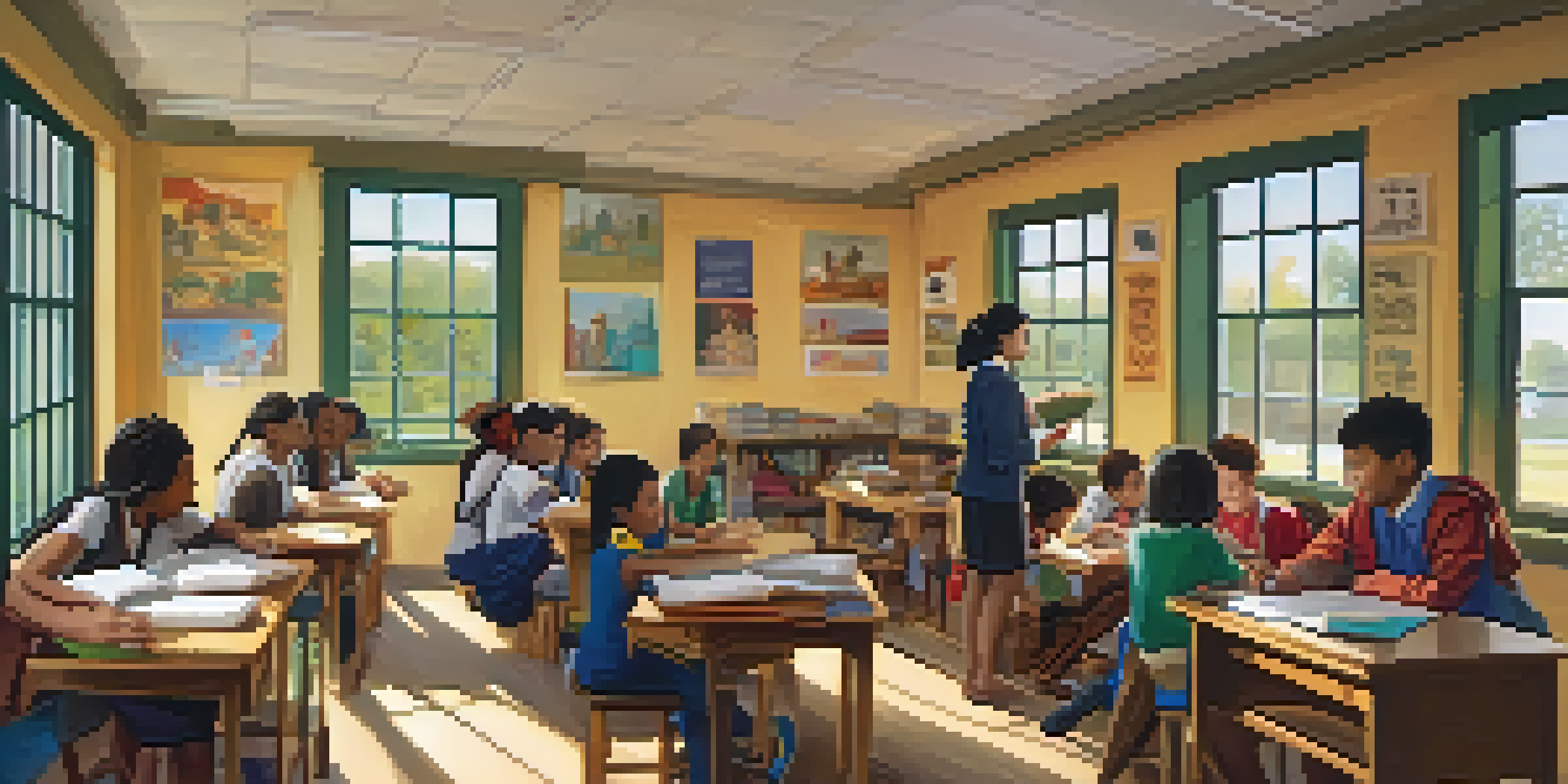Intercultural Competence in Special Education Practices

Understanding Intercultural Competence in Education
Intercultural competence refers to the ability to communicate and interact effectively across cultures. In special education, this means understanding the diverse backgrounds of students and their families. Each culture brings unique values, beliefs, and communication styles that can influence learning and behavior.
Cultural competence is the ability to understand, communicate with, and effectively interact with people across cultures.
When educators are culturally competent, they can create a more inclusive environment. This not only helps students feel valued but also encourages them to participate actively in their education. Recognizing the differences in cultural perspectives is crucial for fostering a supportive learning atmosphere.
For instance, a teacher who understands that a student's reluctance to speak up may stem from cultural norms can tailor their approach accordingly. By adjusting their teaching methods to align with the student's cultural context, educators can enhance engagement and learning outcomes.
The Role of Cultural Awareness in Special Education
Cultural awareness is a key component of intercultural competence. It involves recognizing and respecting the variations in cultural practices and beliefs that students bring to the classroom. This awareness helps educators avoid misunderstandings and fosters stronger relationships with students and families.

For example, a family from a collectivist culture may prioritize group harmony over individual achievement. Understanding this can influence how educators frame assignments and assess student performance. Instead of emphasizing competition, they might focus on collaboration and shared success.
Cultural Competence Enhances Learning
Understanding and respecting diverse cultural backgrounds allows educators to create an inclusive environment that promotes student engagement and success.
By actively promoting cultural awareness, educators can create a safe space where all students feel understood and included. This not only enhances learning but also builds trust between educators and families, leading to better educational outcomes.
Strategies for Developing Intercultural Competence
Developing intercultural competence requires intentional strategies and ongoing reflection. Educators can start by engaging in professional development focused on cultural sensitivity and inclusivity. Workshops, webinars, and reading materials can provide valuable insights into diverse cultural perspectives.
The single biggest problem in communication is the illusion that it has taken place.
Additionally, educators should seek to build relationships with families from various backgrounds. This can be done through regular communication and community involvement, which helps educators understand their students' cultural contexts better. By fostering these connections, educators can tailor their approaches to meet the specific needs of their students.
Furthermore, collaboration with colleagues from diverse backgrounds can enrich an educator's understanding of intercultural dynamics. Sharing experiences and strategies can lead to innovative practices that address the unique challenges faced in special education settings.
Implementing Culturally Responsive Teaching Practices
Culturally responsive teaching is an approach that recognizes the importance of including students' cultural references in all aspects of learning. This method involves adapting curriculum content and instructional strategies to reflect the diverse backgrounds of students. In special education, this is particularly important as it helps make learning relevant and relatable.
For instance, using culturally relevant examples in lessons can help students connect with the material on a personal level. This not only boosts engagement but also validates their cultural identity, promoting self-esteem and motivation. When students see themselves reflected in the curriculum, they are more likely to participate and succeed.
Family Engagement Boosts Education
Involving families in the educational process provides valuable insights into cultural practices that enhance teaching and support student development.
Moreover, implementing culturally responsive teaching fosters an inclusive classroom environment. It encourages students to share their cultural experiences and perspectives, enriching the learning experience for everyone. Ultimately, this approach cultivates respect and appreciation for diversity among all students.
Overcoming Challenges in Culturally Diverse Classrooms
Despite the benefits, educators may face challenges when implementing intercultural competence in special education. Miscommunication, biases, and stereotypes can arise, potentially hindering the learning process. Acknowledging these challenges is the first step toward overcoming them.
For example, a teacher might unintentionally reinforce stereotypes based on a student's cultural background. To address this, educators must actively engage in self-reflection and seek feedback from colleagues and families. This can help identify biases and create strategies to mitigate their impact on teaching and learning.
Additionally, fostering an open dialogue about cultural differences can help dispel misconceptions. Creating a classroom culture where students feel safe discussing their experiences promotes understanding and helps everyone navigate the complexities of a diverse environment.
The Importance of Family and Community Engagement
Engaging families and communities in the educational process is crucial for fostering intercultural competence. When educators involve families in their children's education, they gain insights into cultural practices that can inform their teaching. This collaboration creates a support system that benefits students both at home and in school.
For example, hosting cultural events or workshops can encourage families to share their traditions and values with the school community. This not only enhances cultural awareness among educators and peers but also empowers families to take an active role in their children's education.
Culturally Responsive Teaching Matters
Adapting teaching methods to reflect students' cultural identities fosters a sense of belonging and improves educational outcomes.
Moreover, building strong partnerships with community organizations can provide additional resources and support for culturally diverse students. By working together, educators and community members can address specific needs and challenges, ultimately leading to improved educational outcomes.
Measuring the Impact of Intercultural Competence
Assessing the impact of intercultural competence in special education practices is essential for continuous improvement. Educators should regularly evaluate their strategies to determine what works and what needs adjustment. This process may involve collecting feedback from students, families, and colleagues to gain a comprehensive understanding of the effectiveness of their approaches.
For instance, conducting surveys or focus groups can provide valuable insights into how students perceive the inclusivity of their learning environment. By analyzing this feedback, educators can identify areas for growth and implement changes that enhance intercultural competence.

Additionally, tracking student progress and engagement can help measure the success of culturally responsive practices. Positive outcomes, such as improved academic performance and increased participation, indicate that these approaches are making a difference in students' educational experiences.